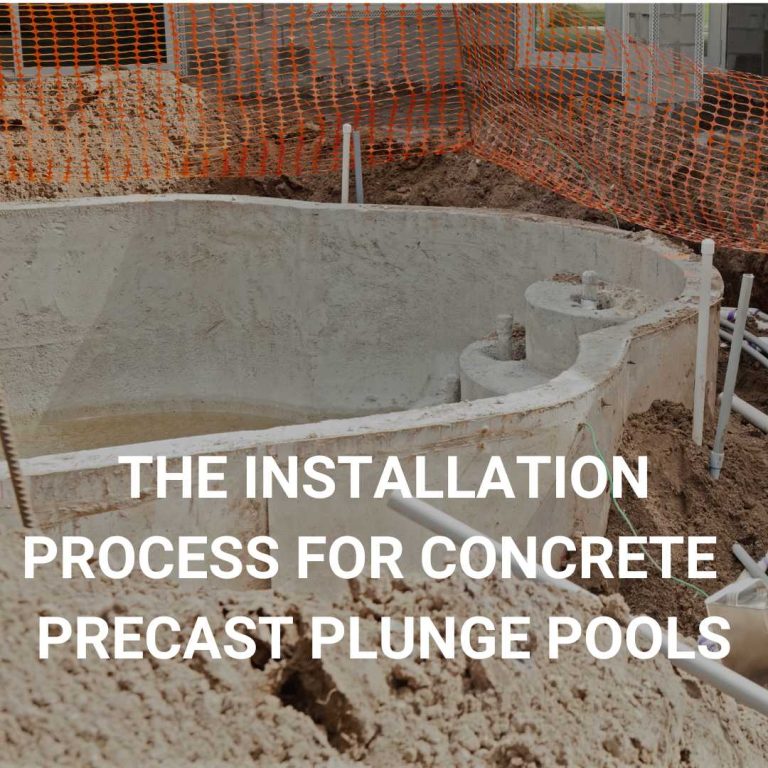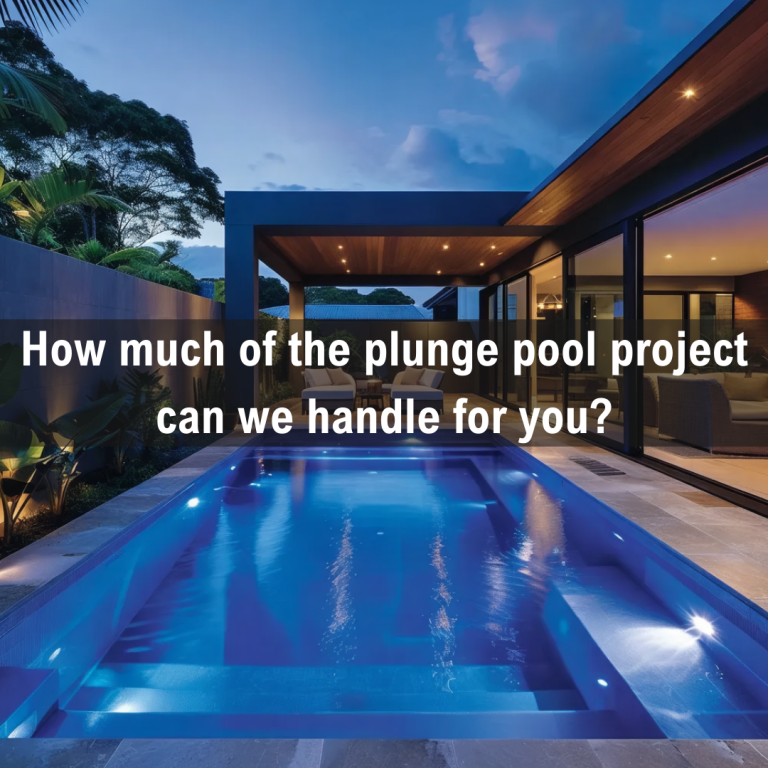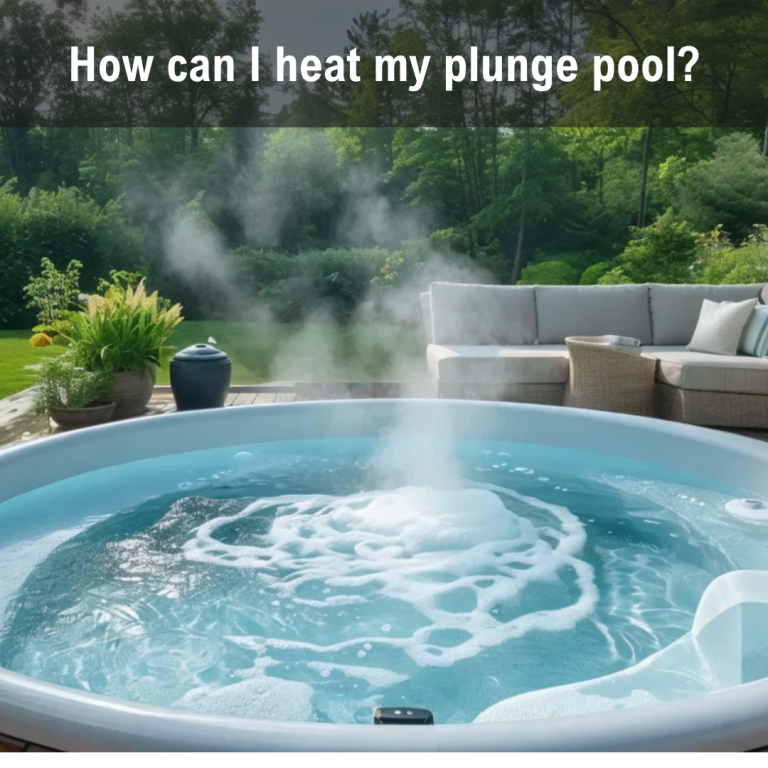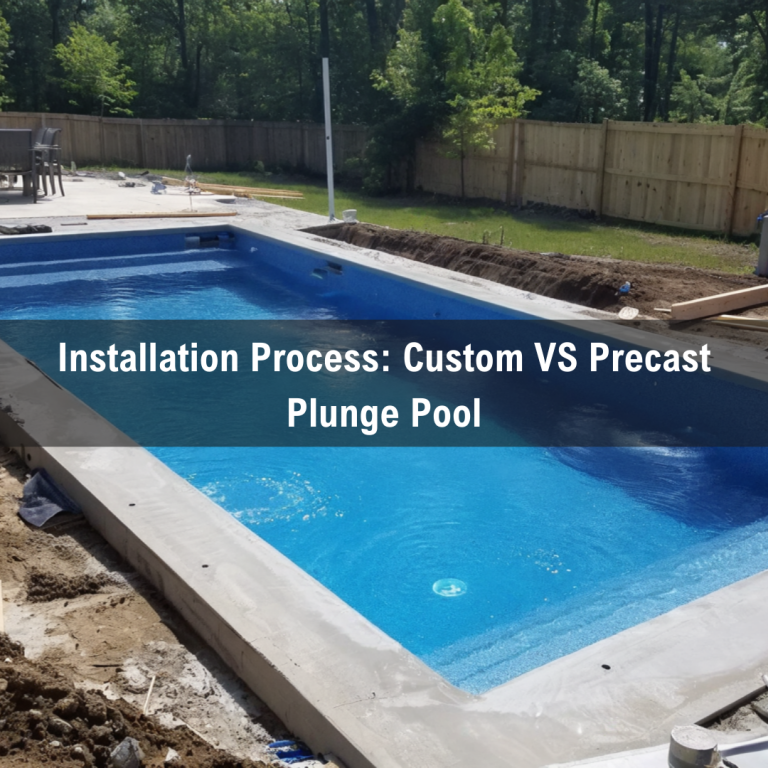As experts with a proven track record in the pool construction industry, we at Plunge Pools Brisbane are renowned for offering top-quality round concrete pools that boast exceptional longevity.
In this article, we’ll explore the factors that influence the longevity of these pools, helping you make an informed decision for your backyard oasis.
Table of Contents
ToggleFrom Concrete Skeleton to a Spectacular Garden
A round concrete pool begins as a concrete skeleton, a robust structure that can withstand the test of time. Once installed, it can be transformed into a beautiful garden feature through landscaping and design. You can add features such as waterfalls, lighting, and surrounding decks to create a stunning outdoor oasis. This transformation not only enhances the aesthetic appeal of your backyard but also increases the overall value of your property.
Why Install a Concrete Pool?
- Year-Round Enjoyment – Concrete pools can be heated and designed for all-season use, giving you a relaxing retreat anytime of year.
- Low Structural Maintenance – While the surface may need occasional care, the concrete shell is incredibly tough and rarely needs major repairs.
- Fully Integrated Features – Want a built-in spa, swim jets, or hidden lighting? Concrete allows seamless integration of advanced pool features.
- Perfect for Forever Homes – If you’re staying long-term, a concrete pool gives you a luxurious, permanent feature that evolves with your home.
- Custom Fit for Indoor or Courtyard Spaces – Concrete can be shaped to fit tight or covered spaces, unlike prefabricated pool shells.
Factors That Affect the Life Expectancy of a Pool
Construction Quality
The construction quality of your round concrete pool is one of the most significant factors affecting its lifespan. A professionally installed pool by a licensed pool builder will typically last longer than one that is poorly constructed. Quality materials and proper techniques during installation are crucial for ensuring the pool’s durability. Concrete pools are known for their strength, but if the initial construction is flawed, it can lead to structural issues down the line. Learn how concrete pools offer durability and long-term advantages with proper construction.
How is a Custom Concrete Pool made?
The construction of a custom concrete pool involves several key steps:
Design and Planning: The process begins with collaborating with a professional pool designer or architect to create a detailed plan. This includes determining the pool’s size, shape, depth, and desired features, ensuring the design aligns with the homeowner’s vision and outdoor space.
Excavation: Once the pool design is finalised, excavation begins. Heavy machinery is used to dig out the area where the pool will be constructed, following the outlined layout.
Formwork and Reinforcement: After excavation, formwork is installed to shape the pool, and steel reinforcement (rebar) is placed to provide structural integrity.
Plumbing and Electrical Installation: Plumbing lines and electrical conduits are installed within the pool structure, accommodating water supply, drains, and electrical components for features like lighting.
Shotcrete or Gunite Application: A mixture of concrete and sand (shotcrete or gunite) is applied to the pool’s walls and floor. This is done using a pneumatic spray method, creating a solid concrete shell.
Curing: The concrete must cure properly, which involves keeping it moist to allow it to harden and gain strength. This process can take several weeks.
Finishing Touches: After curing, the pool is finished with plaster, tiles, and coping, followed by the installation of decking around the pool area. Finally, the pool is filled with water, and the initial chemical balance is established.
What is a Precast Concrete Pool?
A precast concrete pool is constructed using moulds that are manufactured off-site and then transported to the installation location. The advantages of precast pools include:
- Speed of Installation: Precast pools can be installed more quickly than traditional poured concrete pools, as the shells are already formed and require less on-site construction time.
- Consistency and Quality Control: Since the shells are made in a controlled environment, there is often greater consistency in quality compared to on-site pouring.
However, precast pools may have limitations in terms of customisation compared to fully custom poured concrete pools, which can be shaped to fit specific designs and features.
Benefits of a Concrete Pool
Thinking about installing a pool and wondering if concrete is worth the investment? You’re not alone—and the answer is a confident yes for many homeowners. Concrete pools offer a range of benefits that make them a top choice for long-term value, flexibility, and durability.
Here’s why concrete pools continue to be a favourite:
1. Unlimited Design Flexibility
One of the biggest perks of a concrete pool is the ability to customise the shape, size, and depth to suit your space and lifestyle. Whether you’re after a sleek lap pool, a curved oasis, or a compact plunge pool for a smaller yard, concrete gives you the freedom to build exactly what you envision—down to the details like steps, ledges, benches, and even water features.
2. Built to Last for Decades
With proper care, a concrete pool can last 50 years or more. It’s a long-term investment that pays off with strength and durability. While other pool materials may need replacement or frequent repairs, concrete pools are known for their solid structure and resilience—making them a smart choice for those looking for something that stands the test of time.
3. Variety of Finishes
From smooth pebblecrete to fully tiled surfaces, concrete pools offer a wide range of finishes and textures to match your aesthetic. Whether you prefer a natural look or a polished resort-style vibe, the finishing options for concrete are virtually endless.
4. Ideal for Sloping or Irregular Blocks
Concrete pools are versatile in construction, making them perfect for tricky or uneven landscapes. If your property is on a slope or has unique terrain, concrete allows for creative, levelled solutions that other materials might struggle with.
5. Increases Property Value
Concrete pools add a premium touch to your backyard and often increase the resale value of your home. Their customised design, luxury appeal, and structural longevity make them a major draw for future buyers.
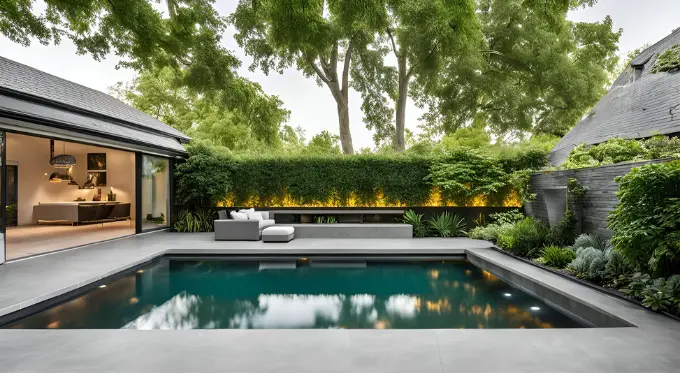
Custom VS Precast Pool – What’s better?
The choice between a custom concrete pool and a precast concrete pool depends on several factors:
- Customisation: Custom concrete pools offer greater flexibility in design, allowing homeowners to create unique shapes and features tailored to their preferences. Precast pools, while quicker to install, may not provide the same level of customisation.
- Installation Time: Precast pools generally have a shorter installation timeline due to the prefabrication process, making them a good option for those looking for a faster setup.
- Cost: The cost can vary significantly between the two options. Custom pools often involve higher labour costs due to the complexity of the design and construction, while precast pools may have lower labour costs but could incur higher excavation costs depending on the size of the pool.
- Maintenance and Longevity: Both types of pools can have long life expectancies, but custom concrete pools are often seen as more durable and require less frequent maintenance compared to other pool types, such as fibreglass or vinyl.
Ultimately, the decision should be based on the homeowner’s budget, desired design, and timeline for installation.
Maintenance Practices of concrete pool
Regular maintenance of the pool practices plays a vital role in extending the life of your pool. This includes:
- Water Chemistry: Keeping the pool water balanced is essential. Regularly testing and adjusting the pH and chlorine levels will help prevent algae growth and damage to the pool surface. Poor water chemistry can lead to corrosion and deterioration of the pool’s structure.
- Cleaning: Regular cleaning is necessary to keep your pool in top condition. This includes skimming the surface for debris, vacuuming the bottom, and brushing the walls. A clean pool not only looks better but also reduces the risk of algae and other issues that can shorten its lifespan.
- Repairs: Addressing minor repairs promptly can prevent more significant problems. If you notice cracks or leaks, it’s essential to fix them as soon as possible to avoid further damage.
The Type of Plunge Pool You Have
The type of pool you choose can significantly impact its lifespan. For instance, a plunge pool may have different maintenance requirements compared to a larger in-ground pool. While fibreglass pools are known for their smooth surfaces and lower maintenance needs, concrete pools offer greater durability and customisation options. Each type has its pros and cons, and understanding these differences can help you make an informed decision.
In-Ground Pool’s Location
The location of your pool can also influence its longevity. Swimming Pools that are exposed to harsh sunlight, heavy rain, or extreme temperatures may experience more wear and tear. Additionally, if your pool is located near large trees, you may find that leaves and debris accumulate more quickly, requiring more frequent cleaning and maintenance to long do they last.
Environmental Conditions
Several environmental factors can affect the life expectancy of your pool:
- Soil Type: The type of soil in which your concrete swimming pool is installed can impact its stability. Some soils may shift or settle over time, which can affect the pool’s structure.
- Weather Conditions: Extreme weather conditions, such as heavy rainfall or high winds, can also impact the lifespan of your pool. It’s essential to consider your local climate when planning your pool installation.
- Vegetation: The presence of vegetation around your pool can lead to increased maintenance. Plants can shed leaves and debris, which can clog filters and require more frequent cleaning.
Usage Frequency
How often you use your pool can also affect its lifespan. Frequent use can lead to more wear and tear, necessitating more regular maintenance. For example, if you host parties or have children who use the swimming pool often, you may need to clean and balance the water more frequently.
Resurfacing Needs
As mentioned earlier, concrete pool surfaces require resurfacing approximately every 10 to 15 years. This process involves applying a new layer of plaster or aggregate to the pool’s surface. Resurfacing is essential for maintaining the pool’s appearance and structural integrity. If you neglect this maintenance task, you may find that your pool develops cracks, stains, or rough patches over time.
Conclusion
In summary, a round concrete pool can last a lifetime with proper care and maintenance. By investing in quality construction and committing to regular upkeep, you’ll ensure your pool remains a beautiful and functional part of your home for decades to come. Understanding the factors that affect the lifespan of your pool will help you make informed decisions about maintenance and care.
We hope that the information above provides you with a clearer picture of the expectancy of round concrete pools, which can often be mysterious.
Choosing the right design and features for your round concrete pool should be based on practicality, your space, and your personal preferences.
Our experts at Plunge Pools Brisbane are here to help you if you still feel unsure about how best to proceed with your round concrete pool project.
People Also Ask
Are Precast Concrete Plunge Pools Better?
Precast concrete plunge pools can be a great option for those looking for a quicker installation process, as they are manufactured off-site and delivered ready to install. However, they may not offer the same level of customisation as a traditional round concrete pool. If you prefer a unique design, a custom-built concrete pool may be the better choice.
What Type of Pool lasts the Longest & How long they do last?
Concrete pools generally last the longest, often exceeding 50 years with proper maintenance. In comparison, fibreglass pools typically last 20 to 30 years, while vinyl liner pools last about 10 to 15 years. The longevity of your pool will depend on various factors, including construction quality and maintenance practices.
Why should you consider getting a round concrete pool?
A round concrete pool offers durability, customisation options, and can significantly increase your home’s value. It’s a long-term investment that can provide years of enjoyment. Additionally, concrete pools can be designed to fit any backyard space, allowing for creativity in your outdoor design.
What are the pros and cons of owning a concrete pool?
Pros:
- Long lifespan (50+ years)
- Highly customisable
- Increases property value
- Durable and strong
Cons:
- Higher initial cost
- Requires regular maintenance and resurfacing
- Longer installation time compared to prefabricated options

